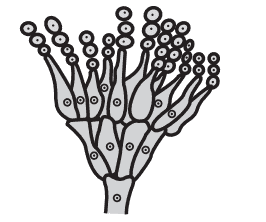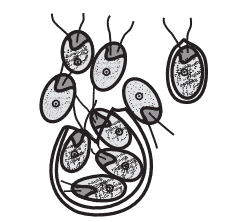1. Which information is false about the organism shown in the diagram?

a) Reproduce by basidiospores
b) It is a multicellular fungus
c) It is the conidia of penicillium
d) Belongs to ascomycetes
Explanation: Reproduce by basidiospores
2. Which of the following flowers only once in their lifetime?
a) Mango
b) Neem
c) Bamboo
d) All of these
Explanation: Bamboo
3. Which of the following plant flowers once in 12 years?
a) Mangifera indica
b) Strobilanthus kunthiana (Neelakuranji)
c) Helianthus annus
d) Papver somniferum
Explanation: Strobilanthus kunthiana (Neelakuranji)
4. Which of these statement is true about Strobilanthus kunthiana?
a) This plant flowers during September to October 2006.
b) Its mass flowering transformed large tracks of hilly areas in Kerala, Karnataka and Tamil
Nadu into blue stretches.
c) It flowers once in 12 years.
d) All the above
Explanation: All the above
5. In animals, the juvenile phase is followed by what changes prior to active reproductive
behaviour?
a) Morphological changes
b) Physiological changes
c) Genetical changes
d) Both (a) and (b)
Explanation: Both (a) and (b)
6. Which of the following mammals show menstrual cycle?
a) Monkeys
b) Apes
c) Humans
d) All of these
Explanation: All of these
7. The diagram shows:

a) Zoospores of hydra
b) Conidia of Penicillium
c) Gemmules in sponge
d) Zoospores of chlamydomonas
Explanation: Zoospores of chlamydomonas
8. Oestrous cycle occurs in
a) Cows
b) Rats
c) Deer
d) All of these
Explanation: All of these
9. Find the correct statement.
a) ‘Reproductive phase’ is of same duration in all organisms.
b) Birds in captivity can be made to lay eggs throughout the year.
c) Female of non-primates shows cyclical changes during reproductive phase which is
known as menstrual cycle.
d) Perennial plants show clear cut vegetative, reproductive and senescent phase.
Explanation: "Birds in captivity can be made to lay eggs throughout the year". This is correct statement.
10. Most wild mammals are
a) Continuous breeder
b) Seasonal breeder
c) Continuous for half year, seasonal for next half year
d) None of these
Explanation: Seasonal breeder